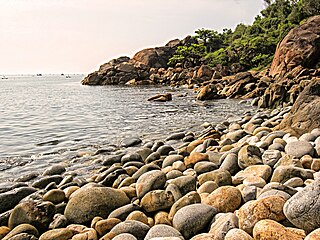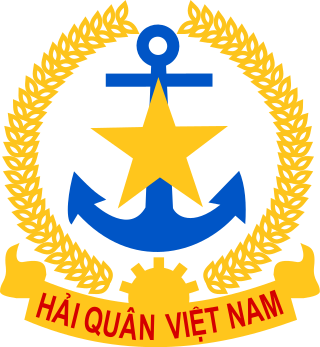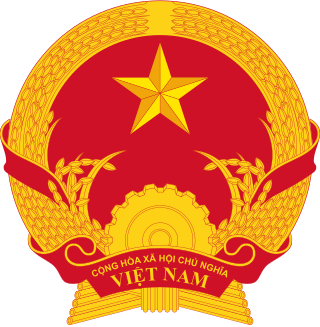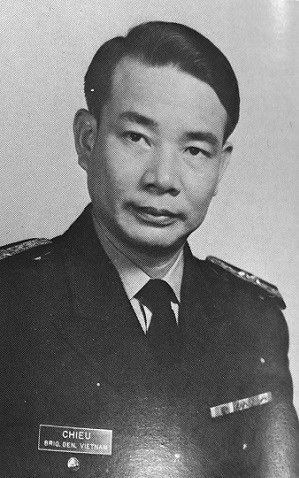
Bình Định is a province of Vietnam. It is located in Vietnam's South Central Coast region. It covers an area of 6066 km2, comprising 11 district-level sub-divisions, with a population of over 1.5 million people as of 2021. The province is known for its scenery and beaches. There are also a number of Cham structures. Majority of the province is covered by mountains or hills. Its capital Quy Nhon served as the capital of the historic Tây Sơn dynasty. Economically the province has the most productive primary sector in the South Central Coast region, mostly because of its large output of rice, coconuts and its strong livestock, forestry and fishing sectors.

The Vietnam People's Navy, or the Naval Service, also known as the Vietnamese People's Navy or simply Vietnam/Vietnamese Navy, is the naval branch of the Vietnam People's Army and is responsible for the protection of the country's national waters, islands, and interests of the maritime economy, as well as for the co-ordination of maritime police, customs service and the border defence force.
The 4th Military Region of Vietnam People's Army, is directly under the Ministry of Defence of Vietnam, tasked to organise, build, manage and command armed forces defending the North Central Vietnam. The predecessor, 4th War Zone was established by the order of Ho Chi Minh on 15 October 1945, and this day has become the traditional day of the Military Zone. On 3 June 1957, Ho Chi Minh signed the ordinance 17/SL to establish 4th Military Zones on the basis of 4th Joint Zone, simultaneously with other military zones: the North Vietnamese, North West, North East, Left Bank, Right Bank.
The 7th Military Region of Vietnam People's Army, is directly under the Ministry of Defence of Vietnam, tasked to organise, build, manage and command armed forces defending the South East Vietnam.

Hoàng Văn Thái, born Hoàng Văn Xiêm, was a Vietnamese Army General and a communist political figure. His hometown was Tây An, Tiền Hải District, Thái Bình Province. During the Tết Offensive, he was the highest senior North Vietnamese officer in South Vietnam. He was the first chief of staff of the Vietnam People's Army, and was responsible for key military forces in North Vietnam. He was also Chief of Staff in the Battle of Điện Biên Phủ.

Lieutenant General Trần Hanh is a pilot of the Vietnam People's Air Force and later Deputy Minister of Defence of Vietnam. During the Vietnam War, Trần Hanh was a MIG-17 pilot and officer of the 921st Regiment, he shot down a F-105D in April 1965. After the war he became the Deputy Chief of the General Staff and later Deputy Minister of Defence of Vietnam before retired in 2000.
Nguyễn Văn Hiến is a retired Admiral, and former Vice Minister of Defense (Vietnam) from 2009–2016.

Phạm Bình Minh is a Vietnamese diplomat and politician serving as the Minister of Foreign Affairs from 2011 to 2021 and as Deputy Prime Minister of Vietnam from 2013 to 2023. Between September 2021 and his dismissal in January 2023, he also served as the Permanent Deputy Prime Minister, the most senior among the deputy prime ministers, in the Cabinet of Phạm Minh Chính. Minh was also a member of the Politburo of the Communist Party of Vietnam, the country's highest decision-making body, headed by General Secretary Nguyễn Phú Trọng.
The Members of the 12th Central Committee of the Communist Party of Vietnam were elected at the 12th National Congress on 27 January 2016.

Vũ Văn Dũng, or Võ Văn Dũng, was a general of Tây Sơn dynasty, Vietnam. He and Võ Ðình Tú, Trần Quang Diệu, Nguyễn Văn Tuyết, Lê Văn Hưng, Lý Văn Bưu, Nguyễn Văn Lộc were known as "Seven Tiger Generals of Tây Sơn dynasty".

The Chief of the General Staff is the chief of staff of the General Staff of the People's Army of Vietnam. The Chief of the General Staff performs the task of advising the Minister of Defense in terms of state management and military command. The Chief of the General Staff also serves ex officio as Standing Deputy Minister of Defense. He is appointed by the President of Vietnam, who is the Commander-in-Chief. The current Chief of the General Staff is Colonel General Nguyễn Tân Cương

The 13th Politburo of the Communist Party of Vietnam (CPV), formally the 13th Political Bureau of the Central Committee of the Communist Party of Vietnam (Vietnamese: Bộ Chính trị Ban Chấp hành trung ương Đảng Cộng sản Việt Nam Khoá XIII), was elected at the 1st Plenary Session of the 13th Central Committee (CC) in the immediate aftermath of the 13th National Congress. Nguyễn Phú Trọng was re-elected for his third term as General Secretary of the Communist Party of Vietnam, a position he has held since 2011.
The 1st Regional Command under the Vietnam People's Navy (VPN) is an independent naval warfare command that manages and protects the waters from Quảng Ninh to Hà Tĩnh and the islands in the Gulf of Tonkin, including the Quảng Ninh provinces, Haiphong, Thái Bình, Nam Định, Ninh Bình, Thanh Hóa, Nghệ An, Hà Tĩnh.

The 2nd Regional Command under the Vietnam People's Navy (VPN) is the Naval Operations Command that independently manages and protects the seas from South Bình Thuận to Bạc Liêu and the southern continental shelf, including the important area. The point is the sea with economic - scientific - service clusters on the southern continental shelf, including the southern provinces of Bình Thuận, Bà Rịa–Vũng Tàu, Ho Chi Minh City, Tiền Giang, Bến Tre, Trà Vinh, Sóc Trăng, Bạc Liêu, and the southeast sea of Cà Mau province.
The 3rd Regional Command under the Vietnam People's Navy (VPN) is an independent naval warfare command that manages and protects the waters between the Central region, from Quảng Bình to Bình Định, including the provinces of Quảng Bình, Quảng Trị, Thừa Thiên Huế, Da Nang, Quảng Nam, Quảng Ngãi, Bình Định including Cồn Cỏ District, Lý Sơn District, Paracel Islands, etc.
The 4th Regional Command under the Vietnam People's Navy (VPN) is the naval operations command that independently manages and protects the Spratly Islands, Phú Quý Island, South China Sea and the South Central Coast, from Phú Yên to the North Bình Thuận including the provinces: Phú Yên, Khánh Hòa, Ninh Thuận and the North of Bình Thuận. Its headquarter is in the Cam Ranh Bay Navy Base.

Hồ Tấn Quyền, was a senior navy officer of the Republic of Vietnam Navy with the rank of Navy Colonel. He came from the first class at the Naval Officers School, which was taken over by the Government of Vietnam and established from the French Naval facility transferred to the Vietnamese Navy located in a province in the Central Coast of Vietnam. He was the third Commander of the Navy from August 1959 until his assassination on November 1, 1963.

The 13th Central Committee of the Communist Party of Vietnam (CPV) has been in session since the conclusion of the 13th National Congress in 2021. It elected, at its 1st Plenary Session, the Politburo, about half of the membership of the Secretariat and the Central Inspection Commission of the 13th term.

Phạm Xuân Chiểu was an infantry general of the Army of the Republic of Vietnam, with the rank of Lieutenant General. He came from the Martial Arts School established by the Army of Vietnam Nationalist Party in the Northwestern region of North Vietnam, training Vietnamese people in parties to serve the resistance forces. Some later joined the French Union Army. During his time in the army, he was always assigned to take on positions related to consulting, so the consulting field can be considered as his specialty. He was also one of the few officers promoted to the rank of general during the First Republic period. This proves that he himself was favored by President Ngô Đình Diệm. However in the 1963 coup, he was a member of the leading group of generals.











